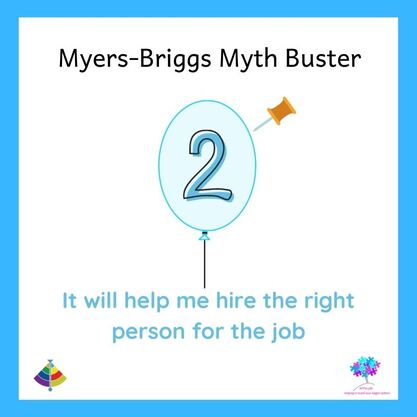The MBTI can help me to hire the right person.That’s a no! The Myers-Briggs Type Indicator (MBTI) framework should NOT be used as part of the recruitment process and here are a few reasons why:
However, once you HAVE recruited someone to your team, the MBTI framework is a fabulous tool to develop their self-awareness and highlight their strengths as well as appreciate how others in the team may work. The MBTI assessment will help me hire the right person.
Hiring employees is one of the most difficult actions you can undertake. You work with little data and usually have to make a relatively quick decision that will have major implications for your company and cost you significant amounts of money on an ongoing basis. Few other things can improve or hurt your operations and bottom line so much. There are many people who misunderstand and misuse the MBTI. One of the biggest ways they do this is by thinking that the MBTI assessment can tell you whether a person is a good fit for a particular role. The goal of any pre-employment assessment should be to measure as many job-related characteristics as possible and in short this is not the MBTI. The design of the MBTI assessment is for development, and is not intended for use in selection of job candidates, nor for making internal decisions regarding job placement, selection for teams or projects, or other similar activities. Here are a few reasons why it’s not a good idea:
Furthermore, the idea of predicting success in a job from a set of psychological inclinations is unstable. People of many different types excel at the same job for different reasons. Individuals should not be pigeonholed based on their personality preferences. The MBTI tool can't tell you who to hire, but what it can do is help you work with your team so that everyone gives his or her best performance - what better opportunity for development? Many organisations take the opportunity to run the assessments with new recruits and on Graduate intakes to help all appreciate the organisations culture and team make up for instant results. Understanding how people communicate, interact, and collaborate should help you better run your company along with a more developed and engaged workforce. Final note of caution: It is unethical and, in some cases, illegal to require job applicants to take the assessment if the results will be used to screen out applicants and the person administrating the assessment, should not counsel a person to, or away from, a particular career, personal relationship or activity based solely upon type information. Get in touch if you would like to hear more about the assessment or read more about the MBTI. This blog forms part of the Myers-Briggs myth busting series I am doing with Tamsin Regnes.
0 Comments
Leave a Reply. |

